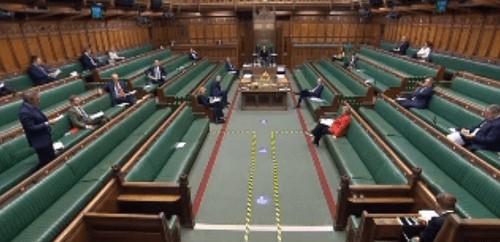At the start of the coronavirus lockdown some political processes were put on ice, but as the crisis has evolved politics itself has heated up.
Opinion
Change workplaces for good
There was a general truce right at the start, which was intensified when the prime minister went into intensive care. Boris Johnson provokes strong emotions, but when his life hung in the balance politics as normal was off the agenda.
However, the government is coming under increasing pressure and the new leader of the opposition Keir Starmer’s forensic approach to prime minister’s questions in the House of Commons is a new headache for the government.
 With the number of MPs allowed physically into the chamber limited to 50, the usual shouting and cheering is gone
With the number of MPs allowed physically into the chamber limited to 50, the usual shouting and cheering is gone
The House of Commons chamber has not been able to replicate its inherent character in a Covid-19 secure form. With the number of MPs allowed physically into the chamber limited to 50, the usual shouting and cheering is gone.
Instead we are treated to an insight to a politician’s home study – although most MPs have settled on the plainest possible backdrop for fear their bookcases will be overly scrutinised. House of Commons select committees have done a better job of holding the government to account and bringing in a wider range of witnesses.
The House of Lords has not been able to adapt – its age profile means that very many peers are required to self-isolate and the virtual House of Lords has produced more moments of comedy than scrutiny.
Lobbying of government has also continued throughout the crisis, with trade unions flexing their muscles maybe more effectively than they have done for a while. When a government starts calling on industry and employers to step up and act in the national interest it is also usually ready to be more pliant.
While the teachers’ unions have divided opinion on school openings, the TUC has been active behind the scenes, working with the CBI and HSE on developing the government’s guidance for employers. One can assume that the big pharma companies involved in developing testing and searching for a vaccine will also have a wish list.
The NHS continues to emerge as a national hero and there is pressure on the government to ensure that public sector workers’ pay is protected despite the threat of cuts to public services – almost two-thirds of MPs believe pay for NHS and care workers should be higher, while 56 per cent say the pay packets of key workers such as bus drivers should also increase.
Our asks of government will have to adapt as well. As we emerge from the lockdown, government will be making decisions that could have an impact on public policy for many years to come. The British Safety Council has been clear that safer workplaces must be very near the top of the government’s priority list.
Throughout we have been working with employers whose workers are at the frontline, including healthcare workers and essential workers in retail, manufacturing and construction. The rush to see the economy recover cannot be used as an excuse to lower work standards.
As the lockdown ends and we see the return to normal life, we have a real opportunity to honour workers. What better mission than to embed real improvements in all of our working environments?
Charles Pitt is head of policy and influencing at the British Safety Council
OPINION

The air we breathe is all our business
By Nicky O’Malley, director of corporate partnerships, Global Action Plan on 01 June 2023
Businesses have a vital role to play in improving air quality – and the UK’s Clean Air Day on 15 June is a great opportunity for companies to begin or renew their efforts in this area.

All jobs greener: why we need workforce transformation for a sustainable future
By Martin Baxter, deputy CEO, IEMA (Institute of Environmental Management & Assessment) on 01 June 2022
The shift to a green economy will create green jobs within new and emerging sectors, while those working in existing sectors will have to gain the requisite green skills to take advantage of the business value-creation opportunities that come from embedding sustainability across the whole organisation.

Preventing chemical pollution: how the UK is falling behind Europe
By Ruth Jones MP for Newport West & Shadow Minister for Agri-Innovation and Climate Adaptation on 01 June 2023


